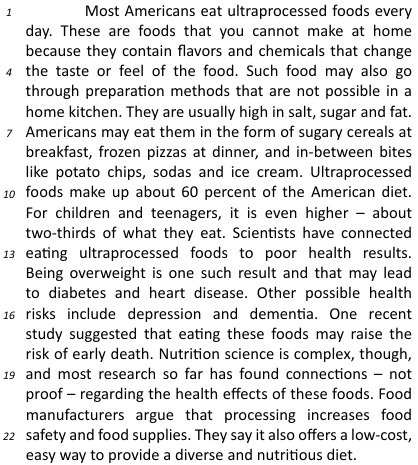Questões de Concurso
Sobre adjetivos | adjectives em inglês
Foram encontradas 551 questões
TEXT:
Making homework count
By Stephanie Hirschman
October 8, 2024
Homework and independent study can make a massive contribution to students’ progress, particularly when classes don’t meet daily, or students aren’t living, working or studying in anglophone environments. There are several issues to consider when setting homework.
Why students are doing homework is a fundamental question which can cover a wide spectrum of reasons. The most obvious is that it offers both teachers and students a chance to check on learning and identify areas for further review and consolidation. Exam preparation courses make use of homework to consolidate and accelerate learning and deliver results. Finally, some institutions require teachers to set homework and some clients, for example parents, believe that a course with homework offers better value for money.
Whatever the reason behind setting homework, be clear with students about how they’ll benefit from the assignment, how to do it effectively, how long they should spend on it and how it will be marked.
The homework that many people expect from a language course is “more of the same” exercises, that is, those that offer extra opportunities to practice grammar or vocabulary from the lesson.
It is also possible to bring in practice from other online or print sources, but this can sometimes be problematic, especially for lower levels. Make sure that the resource you choose maps onto the lesson content without placing extra demands on students, for example, by introducing a completely different context or topic with unfamiliar vocabulary to practice a grammar point. You also need to make sure that terminology is consistent – students who are expecting to practice present continuous may not recognize that it is also called present progressive. With lower levels, go over the instructions and/or demonstrate one of the exercises so they know how to get started.
It's worth mentioning here that flipped learning may also be a useful approach to homework. This is where students preview part of the lesson plan (like a reading or listening task) or research a general topic independently before class in order to maximize opportunities for communicative activities during the lesson.
Other types of homework include semi-controlled practice of target language. Students could write personal sentences including vocabulary items or grammatical structures from the class – note that they may need training to do this. A sentence like, “The milk went off,” is not as effective for learning as, “We had no milk for the coffee this morning – it went off because we didn’t put it in the fridge last night.” You may wish to provide some question or example prompts as support.
An unusual and motivating type of speaking homework is a personalized bingo game. Students create their own bingo card, which might be a 4x4 grid. In each cell, they write a key word or structure from the lesson that they wish to practice during the next few days. They carry the card around in their pocket, and every time they use an item of target language, they can tick it off, aiming to complete a line. This is especially suitable for students who are living, working or studying in anglophone environments. Teachers can monitor progress regularly and even offer small prizes.
The question of what teachers actually do with homework also has multiple possible responses, which will depend on the teaching context. At one end of the spectrum, if there is good buy-in from the students, teachers may only need to point them towards a selected set of “more of the same” exercises and make sure the answers are accessible for self-checking. Make it clear that you welcome questions if anything isn’t clear and test regularly to check understanding.
Whatever choices you make about homework, here’s one final tip. It’s best to complete assignments the day after receiving them and not on the same day. Research on spaced repetition shows that reviewing information after around 24 hours, “just before you forget it,” is the most effective way to boost retention.
Adapted from: https://www.linguahouse.com/blog/post/makinghomework-count
Acesso em 25/10/2024
Complete the sentence with the correct adjective form:
"The Starlink project is one of the most _____ satellite networks."
In the third sentence of the text, “supreme” is an adjective modifying the noun “perfection”.
Judge whether the following items about text I are right (C) or wrong (E).
In the expressions “unalloyed triumph” (first sentence of the text) and “sheer silliness” (first sentence of the second paragraph), the adjectives “unalloyed” and “sheer” convey similar meanings.
As questão diz respeito ao texto. Leia-o atentamente antes de respondê-la.

Taking into account that (T) means ‘True’ and (F) means ‘False’, the correct sequence of propositions is, respectively:
( ) ‘The most explosive’ (line 02) is a comparative of superiority;
( ) In ‘The latest’ (line 13), changing ‘the’ by ‘more’, we have a comparative of superiority;
( ) The two examples aren’t comparatives, but superlatives;
( ) Comparisons with long adjectives like ‘explosive’ (line 02) must have the adding of ‘er’ to the adjective.
Reading skill will help you to improve your understanding of the language and build your vocabulary.
Social Media Across Generations
Today’s grandparents are joining their grandchildren on social media, but the different generations’ online habits couldn’t be more different. In the UK the over-55s are joining Facebook in increasing numbers, meaning that they will soon be the site’s second biggest user group, with 3.5 million users aged 55-64 and 2.9 million over-65s.
Sheila, aged 59, says, I joined to see what my grandchildren are doing, as my daughter posts videos and photos of them. It’s a much better way to see what they’re doing than waiting for letters and photos in the post. That’s how we did it when I was a child, but I think I’m lucky I get to see so much more of their lives than my grandparents did.
Ironically, Sheila’s grandchildren are less likely to use Facebook themselves. Children under 17 in the UK are leaving the site – only 2.2 million users are under 17 – but they’re not going far from their smartphones. Chloe, aged 15, even sleeps with her phone. It’s my alarm clock so I have to she says. I look at it before I go to sleep and as soon as I wake up.
Unlike her grandmother’s generation, Chloe’s age group is spending so much time.......... their phones.......... home that they are missing out on spending time with their friends in real life. Sheila, on the other hand, has made contact with old friends from school she hasn’t heard...................40 years. We use Facebook to arrange to meet all over the country, she says. It’s changed my social life completely.
Teenagers might have their parents to thank for their smartphone and social media addiction as their parents were the early adopters of the smartphone. Peter, 38 and father of two teenagers, reports that he used to be on his phone or laptop constantly. I was always connected and I felt like I was always working, he says. How could I tell my kids to get off their phones if I was always in front of a screen myself? So, in the evenings and at weekends, he takes his SIM card out of his smartphone and puts it into an old-style mobile phone that can only make calls and send text messages. I’m not completely cut off from the world in case of emergencies, but the important thing is I’m setting a better example to my kids and spending more quality time with them.
( ) grandmother’s generation and Chloe’s age group (paragraph 4), the (‘s) are examples of the genitive case.
( ) The pronouns themselves, they and, their (in bold in the 3rd paragraph of the text) are respectively: reflexive pronoun, subject pronoun and possessive pronoun.
( ) The underlined words in the text biggest and better are adjectives in the superlative and comparative form, respectively.
( ) In It’s changed my social life completely, the (‘s) is the contracted form of has.
( ) The discourse marker on the other hand (in the 4th paragraph of the text), is being used to show a logical connection.
Select the option that presents the correct sequence from top to bottom.

Based on the information provided in the text and your knowledge of English grammar, judge the item below.
The word “higher” in the sentence “It is even higher – about two‑thirds of what they eat” is a comparative adjective.
When a person (or team or firm or government) decides how to act in dealings with other people (or teams or firms or governments), there must be some cross-effect of their actions; what one does must affect the outcome for the other. For the interaction to become a strategic game, however, we need the participants’ mutual awareness of this cross-effect. What the other person does affects you; if you know this, you can react to his actions, or take advance actions to forestall the bad effects his future actions may have on you and to facilitate any good effects, or even take advance actions so as to alter his future reactions to your advantage. If you know that the other person knows that what you do affects him, you know that he will be taking similar actions. And so on. It is this mutual awareness of the cross-effects of actions and the actions taken as a result of this awareness that constitute the most interesting aspects of strategy.
When each participant is significant in the interaction, either because each is a large player to start with or because commitments or private information narrow the scope of the relationship to a point where each is an important player within the relationship, we must think of the interaction as a strategic game. Such situations are the rule rather than the exception in business, in politics, and even in social interactions. Therefore, the study of strategic games forms an important part of all fields that analyze these matters.
Avinash Dixit et al. Games of strategy.
New York: W.W. Norton & Coadapted, 2015 (adapted).
Considering to the preceding text, judge the item that follow.
The words “forestall” and “facilitate” (third sentence of the text) work as antonyms and are being used to convey opposite reactions.
Text
Reading skill will help you to improve your understanding of the language and build your vocabulary.
Read the text below carefully.
Social media, magazines and shop windows bombard people daily with things to buy, and British consumers are buying more clothes and shoes than ever before. Online shopping means it is easy for customers to buy without thinking, while major brands offer such cheap clothes that they can be treated like disposable items – worn two or three times and then thrown away
In Britain, the average person spends more than £1,000 on new clothes a year, which is around four per cent of their income. That might not sound like much, but that figure hides two far more worrying trends for society and for the environment. First, a lot of that consumer spending is via credit cards. British people currently owe approximately £670 per adult to credit card companies. That’s 66 per cent of the average wardrobe budget. Also, not only are people spending money they don’t have, they’re using it to buy things they don’t need. Britain throws away 300,000 tons of clothing a year, most of which goes into landfill sites.
People might not realize they are part of the disposable clothing problem because they donate their unwanted clothes to charities. But charity shops can’t sell all those unwanted clothes. Fast fashion goes out of fashion as quickly as it came in and is often too poor quality to recycle; people don’t want to buy it second-hand. Huge quantities end up being thrown away, and a lot of clothes that charities can’t sell are sent abroad, causing even more economic and environmental problems.
However, a different trend is springing up in opposition to consumerism – the ‘buy nothing’ trend. The idea originated in Canada in the early 1990s and then moved to the US, where it became a rejection of the overspending and overconsumption of Black Friday and Cyber Monday during Thanksgiving weekend. On Buy Nothing Day people organize various types of protests and cut up their credit cards. Throughout the year, Buy Nothing groups organize the exchange and repair of items they already own.
The trend has now reached influencers on social media who usually share posts of clothing and make- -up that they recommend for people to buy. Some YouTube stars now encourage their viewers not to buy anything at all for periods as long as a year. Two friends in Canada spent a year working towards buying only food. For the first three months they learned how to live without buying electrical goods, clothes or things for the house. For the next stage, they gave up services, for example haircuts, eating out at restaurants or buying petrol for their cars. In one year, they’d saved $55,000.
The changes they made meant two fewer cars on the roads, a reduction in plastic and paper packaging and a positive impact on the environment from all the energy saved. If everyone followed a similar plan, the results would be impressive. But even if you can’t manage a full year without going shopping, you can participate in the anti-consumerist movement by refusing to buy things you don’t need. Buy Nothing groups send a clear message to companies that people are no longer willing to accept the environmental and human cost of overconsumption.
source: learnenglish.britishcouncil.org
Read the sentences below and determine whether they are true ( T ) or false ( F ), according to structure and grammar use.
( ) The verbs worn and thrown (1st paragraph of the text) has its infinitive form as wear and throw.
( ) The underlined words in the text: nothing, anything and, everyone are examples of relative pronouns.
( ) The singular form of the following words from the text clothes and goods are, respectively cloth and good.
( ) The following sentence from the text: “Fast fashion goes out of fashion as quickly as it came in …” (3rd paragraph of the text). The words in bold are being used to compare things that are equal in some way.
( ) The negative form of the sentence “In one year, they’d saved $55,000.” (5th paragraph of the text), is “In one year, they hadn’t saved $55,000.”
Select the option that presents the correct sequence from top to bottom.
Text II

From: https://images.app.goo.gl/dCFurjmcnZzU7AHS6
Read the text below and answer the question
Paris 2024 Gymnastics: Rebeca Andrade captures
floor exercise gold ahead of Simone Biles and Jordan Chiles
By Scott Bregman / 05 August 2024

If this was a finale, Rebeca Andrade went out in style.
The most decorated Brazilian athlete at the Olympic Games added a gold medal Monday afternoon (5 August), claiming the women's floor title at the Olympic Games Paris 2024.
It's a second Olympic gold for Andrade, the Tokyo 2020 vaulting champion. She has six total medals in her three Olympic appearances. Andrade told media earlier this week that Paris could be her career floor finale.
"I am very happy and proud about what I did," she said. "We came here every day to compete and perform (well). Gymnastics is not an easy sport, it requires a lot from our body and mind.
"I was confident I was able to manage all of the pressure and I worked with my coach in order to achieve what we've done." Andrade's 14.166 was just ahead of Simone Biles (14.133).
Biles' American teammate Jordan Chiles was third, scoring a 13.766 after a scoring inquiry lifted her from fifth to the podium.
It's the 11th Olympic medal for Biles, extending her record as the most decorated U.S. Olympic gymnast. The Brazilian star tumbled a front layout full to full-in and a full-twisting double layout to open. She closed with a controlled double pike.
Andrade took her time coming off the podium, savouring the appreciation from the crowd. When the final scores flashed inside Bercy Arena, the 25-year-old artistic gymnastics star seemed stunned during an embrace with coach.
In the warm-up, Biles looked cautious.
She has been dealing with a strained calf injury throughout the Games and struggled through her signature triple-double (Biles II) in the moments before she competed.
But in competition, that tumbling pass gave her no trouble. Instead, Biles flew out of bounds with both feet on her second and fourth tumbling passes, incurring a .600 total neutral deduction.
"Obviously wasn't my best performances, but at the end of the day, whoever medaled, medaled and that's what's so exciting because you just never know with gymnastics," said Biles afterward. "So I'm not very upset or anything about my performance at the Olympics. I'm actually very happy, proud and even more excited about it."
Chiles' score was originally 13.666 but coaches Laurent and Cecile Landi filed an inquiry. It was accepting, raising her difficulty score by .1 and giving her the bronze medal.
"I didn't even realize my coaches put in an inquiry, and I was like, 'Okay, yeah. Like, let's see... it can vary,'" explained Chiles. "So when it came through, I was very proud of myself. It was my first event final and my first event medal. This is crazy."
https://olympics.com/en/news/paris-2024-gymnastics-rebeca-andrade-captures-floor-exercise-gold
Adjectives are words that modify nouns and usually describe qualities or characteristics.